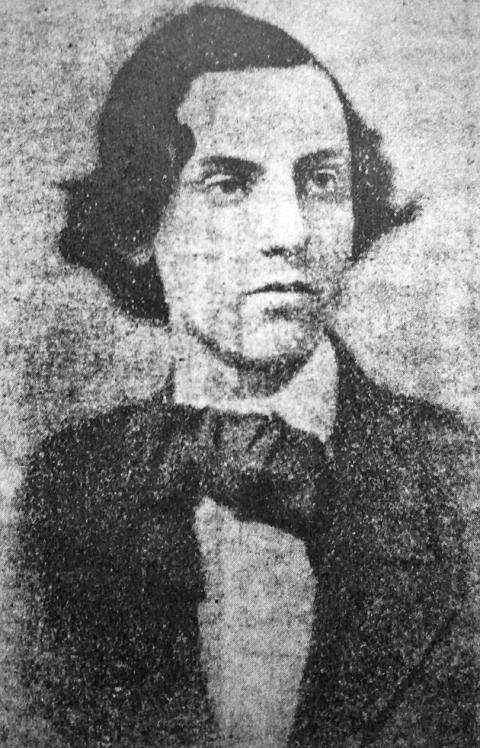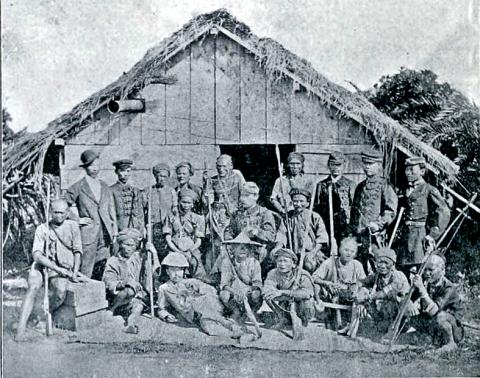In early May 1874, just 20 years after US Commodore Matthew Perry forcefully opened up the isolationist empire to the rest of the world, Japanese troops headed outside of Japan’s borders for the first time in more than 200 years. Their destination: Taiwan.
With them was Edward Howard House, a Bostonian musical prodigy who moved to New York and became a drama critic. During the American Civil War, House served as correspondent for the New York Tribune, almost getting shot in the process.
He traveled to Japan in 1870 when the country was still in political strife as a stringer for the Tribune and later for the New York Times. He also worked as an English professor and founded the English-language Tokio Times.

Photo: Han Cheung, Taipei Times
House accompanied the Japanese troops to Taiwan as a correspondent for the New York Herald, and a year later published The Japanese Expedition to Formosa, a first-person account of what would later be known locally as the Mudan Incident (牡丹社事件).
THE MUDAN INCIDENT
The story originates in late 1871, when two ships from the Kingdom of Ryukyu were blown off course during a storm and were shipwrecked in Taiwan, which was then controlled by a Qing Dynasty with little desire to develop it. One ship landed in the prefectural capital of Tainan without much incident, but the other ended up further south, near today’s Manjhou Township (滿州) in Pingtung.

Courtesy of Wikimedia Commons
Sixty-six passengers made it to land, where they met two Han Chinese who seized their possessions but warned them not to head west where they would meet the headhunting “big ear ghosts.” Distrusting of the men, the castaways headed west anyways — and indeed encountered the “ghosts,” which were Paiwan Aborigines with stretched earlobes.
The Aborigines gave them food and shelter, but forbade them from leaving the village until they came back from a hunting trip. When the sailors escaped, the Aborigines followed and killed 54 of them, the rest being rescued by Han Chinese settlers and taken to safety to Tainan.
The Qing Dynasty, who had no control over the southern (or eastern) Aborigines, refused, or was simply unable, to help, and the event became an excuse for the fledgling Meiji government to attempt a take over of the non-Qing controlled areas of Taiwan and also assert its authority over Ryukyu, which paid tribute to China.
The Japanese government hesitated after opposition by the UK and the US — but on April 27, 1872, expedition commander Saigo Judo refused to wait anymore, defying orders and setting sail on the Yuko Maru. House was on this ship.
LIFE IN HENGCHUN
House’s account was more than just a war journal, as there was not a whole lot of action outside of minor skirmishes and guerrilla attacks except for a three-pronged assault on the Paiwan settlement of Mudan, whose villagers were not responsible for killing the sailors but refused to participate in negotiations.
Of course, there are the supremacist comments, for example this passage describing a Han Chinese settler: “[He] was singularly gifted with good looks, for one of his race.” In fact, he comments on the good looking-ness of practically every person he writes about.
But there are also thoughtful observations: “[The settlers] have a sort of openness and independence of bearing that would not be found in a crowded Chinese city, which is doubtless attributable to their freedom from oppressive authority and self-reliant ways of life.”
Much of the time was spent making military preparations and negotiating in Han Chinese settlements. House notices the prevalence of weapons here — guns, scabbards, bows with iron arrows, spears and lances, all “displayed conspicuously” — a testament to the lawlessness of the area.
There are culture clashes, such as when the Japanese soldiers stripped and started bathing in water tubs in plain sight in the village, which caused a stir. Locals relentlessly pestered the troops to let them try the Gatling guns — even coming up with various schemes — to no avail.
Also interesting was that when the Japanese hired 400 locals to help them build the camp, many who showed up were women with children still strapped to their backs and elderly — and there was even a blind man. House describes them as unruly and inefficient, even taking up their guns and going on strike for higher wages at one point.
The book goes on and follows the military operations, negotiations with Aborigines and later-arriving Chinese officials and tropical epidemics among Japanese troops — but it is the descriptions of everyday life in a wild and lawless Taiwan that sets it apart from other books on the incident.
By the end of the incident, Japan had mobilized more than 6,000 people and spent far more than the reparations it received from the Qing. While the expedition paved the way to the empire’s eventual annexation of Ryukyu, all the troops retreated with no territorial gains in Taiwan.
It did not matter anyway, as just 20 years later, Japan got more than the Aborigine areas — it swallowed Taiwan entirely.
Taiwan in Time, a column about Taiwan’s history that is published every Sunday, spotlights important or interesting events around the nation that have anniversaries this week.

William Liu (劉家君) moved to Kaohsiung from Nantou to live with his boyfriend Reg Hong (洪嘉佑). “In Nantou, people do not support gay rights at all and never even talk about it. Living here made me optimistic and made me realize how much I can express myself,” Liu tells the Taipei Times. Hong and his friend Cony Hsieh (謝昀希) are both active in several LGBT groups and organizations in Kaohsiung. They were among the people behind the city’s 16th Pride event in November last year, which gathered over 35,000 people. Along with others, they clearly see Kaohsiung as the nexus of LGBT rights.

Jan. 26 to Feb. 1 Nearly 90 years after it was last recorded, the Basay language was taught in a classroom for the first time in September last year. Over the following three months, students learned its sounds along with the customs and folktales of the Ketagalan people, who once spoke it across northern Taiwan. Although each Ketagalan settlement had its own language, Basay functioned as a common trade language. By the late 19th century, it had largely fallen out of daily use as speakers shifted to Hoklo (commonly known as Taiwanese), surviving only in fragments remembered by the elderly. In

Dissident artist Ai Weiwei’s (艾未未) famous return to the People’s Republic of China (PRC) has been overshadowed by the astonishing news of the latest arrests of senior military figures for “corruption,” but it is an interesting piece of news in its own right, though more for what Ai does not understand than for what he does. Ai simply lacks the reflective understanding that the loneliness and isolation he imagines are “European” are simply the joys of life as an expat. That goes both ways: “I love Taiwan!” say many still wet-behind-the-ears expats here, not realizing what they love is being an

In the American west, “it is said, water flows upwards towards money,” wrote Marc Reisner in one of the most compelling books on public policy ever written, Cadillac Desert. As Americans failed to overcome the West’s water scarcity with hard work and private capital, the Federal government came to the rescue. As Reisner describes: “the American West quietly became the first and most durable example of the modern welfare state.” In Taiwan, the money toward which water flows upwards is the high tech industry, particularly the chip powerhouse Taiwan Semiconductor Manufacturing Co (TSMC, 台積電). Typically articles on TSMC’s water demand